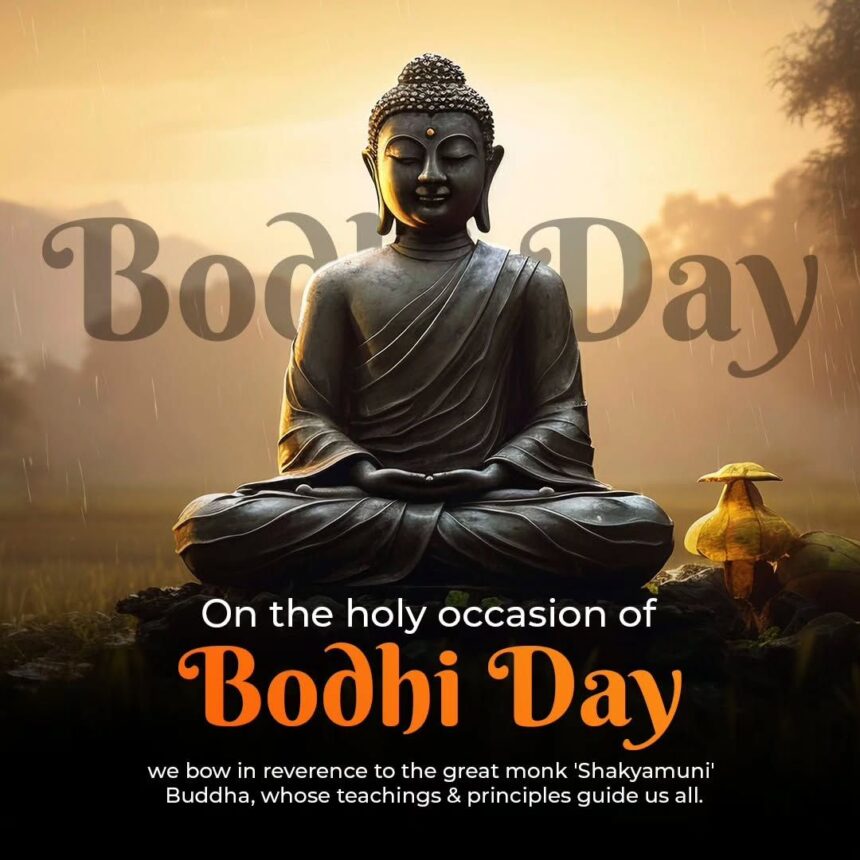Enlightening Truths About Bodhi Day That Will Uplift Your Spirit
🌳 Introduction: The Day the World Awakened
Every year on December 8, millions of Buddhists around the world celebrate Bodhi Day — a quiet, deeply spiritual occasion that marks the moment Siddhartha Gautama, the prince who became the Buddha, attained enlightenment under the Bodhi tree.
- 🌳 Introduction: The Day the World Awakened
- 📜 History of Bodhi Day: When the Light of Awareness Dawned
- 📅 Timeline of Bodhi Day and Buddhist Evolution
- 🧠 7 Enlightening Facts About Bodhi Day
- 🤔 Frequently Asked Questions (FAQs)
- 🔹 What is Bodhi Day?
- 🔹 Who celebrates Bodhi Day?
- 🔹 What do people do on Bodhi Day?
- 🔹 Is Bodhi Day a public holiday?
- 🔹 Can non-Buddhists celebrate Bodhi Day?
- 🌟 Significance of Bodhi Day: Awakening the Inner Light
- 🎎 How Bodhi Day is Observed Around the World
- 💌 Wishing Messages for Bodhi Day
- 📌 Important Points to Remember
- 🧘 Impact on Our Daily Life
- 💠 Importance to Society
- 🧭 How to Celebrate Bodhi Day Mindfully
- 🧘♀️ Conclusion: A Celebration of True Awakening
- 🙏 May this Bodhi Day bring clarity to your thoughts, peace to your heart, and kindness to your actions.
This day doesn’t involve loud celebrations or extravagant traditions. Instead, it invites us to look inward, embrace peace, and reflect on our personal paths toward wisdom, compassion, and freedom from suffering.
Whether you’re Buddhist or simply curious about spiritual evolution, Bodhi Day offers valuable insights into the power of mindfulness and awakening.
📜 History of Bodhi Day: When the Light of Awareness Dawned
The origins of Bodhi Day are rooted in the 6th century BCE, in the forests of ancient India. Siddhartha Gautama, having renounced his princely life, wandered as an ascetic in search of the truth behind human suffering.
After years of harsh discipline and spiritual seeking, Siddhartha sat under a sacred fig tree in Bodh Gaya and vowed not to rise until he attained the truth.
On the eighth day of meditation, as the morning star rose in the sky, enlightenment dawned. He became the Buddha, or “Awakened One,” realizing the Four Noble Truths and the path to Nirvana.
This moment is commemorated annually as Bodhi Day, especially in Mahayana Buddhist traditions.
📅 Timeline of Bodhi Day and Buddhist Evolution
| Time Period | Event |
|---|---|
| 6th century BCE | Siddhartha Gautama attains enlightenment under the Bodhi tree |
| 3rd century BCE | Emperor Ashoka helps spread Buddhism across Asia |
| 1st century CE | Mahayana Buddhism flourishes in Central and East Asia |
| 552 CE | Buddhism arrives in Japan |
| 1867 | Meiji Restoration affects Buddhist traditions in Japan |
| Modern era | Bodhi Day is observed on December 8 by Mahayana Buddhists, especially in Japan (Rohatsu), Korea, China, and the West |
🧠 7 Enlightening Facts About Bodhi Day
“Bodhi” is a Sanskrit word that means awakening or enlightenment.
The Bodhi Tree is a species of fig tree (Ficus religiosa), and a direct descendant of the original still grows in Bodh Gaya, India.
The Buddha meditated for 7 days after his enlightenment, sitting quietly in gratitude and reflection.
Bodhi Day is called “Rōhatsu” in Japan and is celebrated with zazen (seated meditation) and deep introspection.
In Zen monasteries, monks observe intensive week-long meditation retreats (sesshin) leading up to Bodhi Day.
Many Buddhists mark the occasion by consuming milk and rice — the meal the Buddha received after his long fast.
In the West, Bodhi Day is increasingly celebrated as a day for meditation, vegetarian meals, candle lighting, and compassion-based activities.
🤔 Frequently Asked Questions (FAQs)
🔹 What is Bodhi Day?
Bodhi Day is the day when Siddhartha Gautama achieved enlightenment under the Bodhi Tree and became the Buddha. It is observed on December 8.
🔹 Who celebrates Bodhi Day?
Bodhi Day is primarily celebrated by Mahayana Buddhists in Japan, China, Korea, and increasingly by Buddhists in the West.
🔹 What do people do on Bodhi Day?
Observances include meditation, studying Buddhist scriptures, chanting, acts of kindness, and symbolic meals such as milk and rice.
🔹 Is Bodhi Day a public holiday?
While it is a major spiritual event, Bodhi Day is not a national public holiday in most countries.
🔹 Can non-Buddhists celebrate Bodhi Day?
Absolutely. Anyone can reflect on its universal values of compassion, awareness, and inner peace.
🌟 Significance of Bodhi Day: Awakening the Inner Light
🧘 A Personal Path to Liberation
Bodhi Day reminds us that awakening is possible for all. It’s not just a religious concept, but a deep human need — to see clearly, live mindfully, and break free from suffering.
🕯️ Symbol of Peace and Clarity
In a chaotic world, Bodhi Day shines as a gentle call to stillness. It invites us to pause, contemplate, and listen — not to noise, but to our inner truth.
🌱 A Root of Compassion
Bodhi Day’s message is deeply compassionate. The Buddha did not just seek truth for himself — he shared it freely to help others.
🎎 How Bodhi Day is Observed Around the World
| Region | Observances |
|---|---|
| India | Pilgrimages to Bodh Gaya, prayers under the Bodhi Tree |
| Japan | Rohatsu meditation, incense, chanting, zazen |
| China | Ceremonial offerings, scripture reading, lanterns |
| Korea | Tea rituals, communal chanting, temple gatherings |
| Western Countries | Mindfulness meditation, candle lighting, vegetarian meals |
💌 Wishing Messages for Bodhi Day
✨ Spiritual Wishes:
“May the light of Bodhi illuminate your path to peace, wisdom, and compassion.”
“Wishing you a day filled with mindfulness, kindness, and clarity.”
“May your journey lead you to inner awakening, just as it did for the Buddha.”
📜 Quotes to Share:
“Peace comes from within. Do not seek it without.” — Buddha
“There is no path to happiness: happiness is the path.” — Buddha
“Three things cannot be long hidden: the sun, the moon, and the truth.” — Buddha
📌 Important Points to Remember
📅 Date: December 8
🧘♂️ Core Practice: Meditation and mindfulness
🌳 Symbol: Bodhi Tree (Sacred Fig)
📖 Teachings: Four Noble Truths, Eightfold Path
💬 Essence: Awakening to truth and compassion
🧘 Impact on Our Daily Life
🌿 Encourages Mindfulness
Bodhi Day urges us to develop the habit of being present, which reduces stress and enhances clarity.
💛 Cultivates Compassion
Following the Buddha’s example, the day inspires non-violence, kindness, and service to others.
🎯 Motivates Inner Growth
Instead of external resolutions, Bodhi Day inspires spiritual resolutions — understanding the mind, shedding attachments, and embracing awareness.
💡 Promotes Simplicity
Modern life is noisy and chaotic. Bodhi Day’s minimalistic rituals promote a quiet, meaningful celebration rooted in spiritual essence.
💠 Importance to Society
✨ Uplifts Moral Values: By emphasizing truth, non-violence, and right living, Bodhi Day nurtures ethical citizens.
🕊️ Promotes Peace: When individuals are peaceful within, communities reflect harmony without.
🤝 Fosters Inclusiveness: The teachings of the Buddha resonate beyond religions — making Bodhi Day a universal celebration.
📚 Encourages Education: Through studying the Dhamma, it builds understanding, logic, and introspection.
🧭 How to Celebrate Bodhi Day Mindfully
🧘 Sit quietly for at least 30 minutes and observe your breath.
📖 Read or listen to the Four Noble Truths or a Buddhist discourse.
🌳 Light a candle or incense under a tree and express gratitude.
🥣 Eat a simple meal of milk and rice or practice fasting.
🎁 Donate to a cause or perform a selfless act.
🎨 Create or share Bodhi-themed art or calligraphy with others.
🧘♀️ Conclusion: A Celebration of True Awakening
In a world full of distractions and desires, Bodhi Day is a compassionate whisper that urges us to slow down and wake up. It reminds us that enlightenment is not about escaping life but about seeing it clearly, living it mindfully, and walking it kindly.
Whether you’re a lifelong Buddhist or a modern seeker, Bodhi Day invites you to experience silence, stillness, and the profound joy of awakening. The journey starts not with a plane ticket or a ritual — but with a moment of presence.









Keep working ,fantastic job!